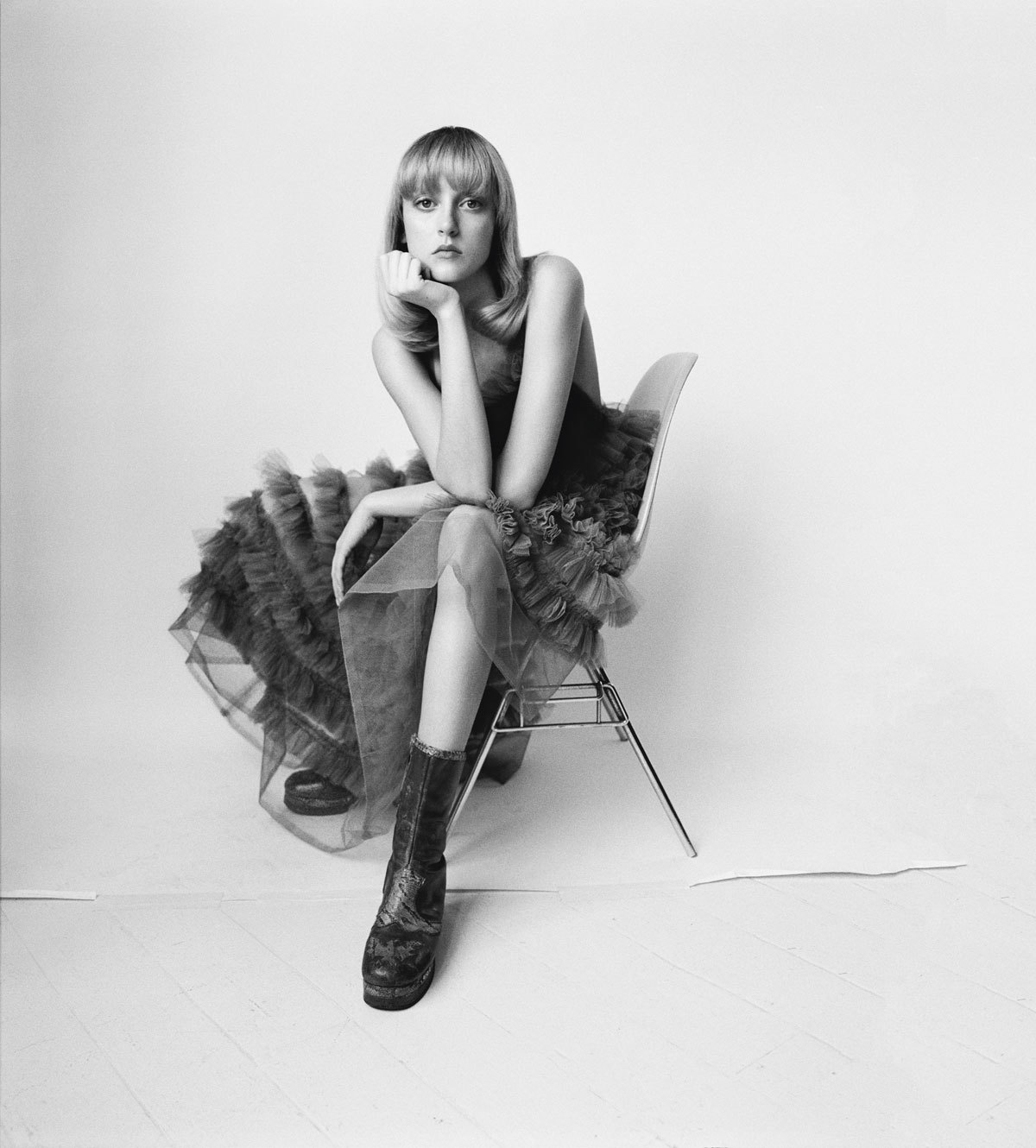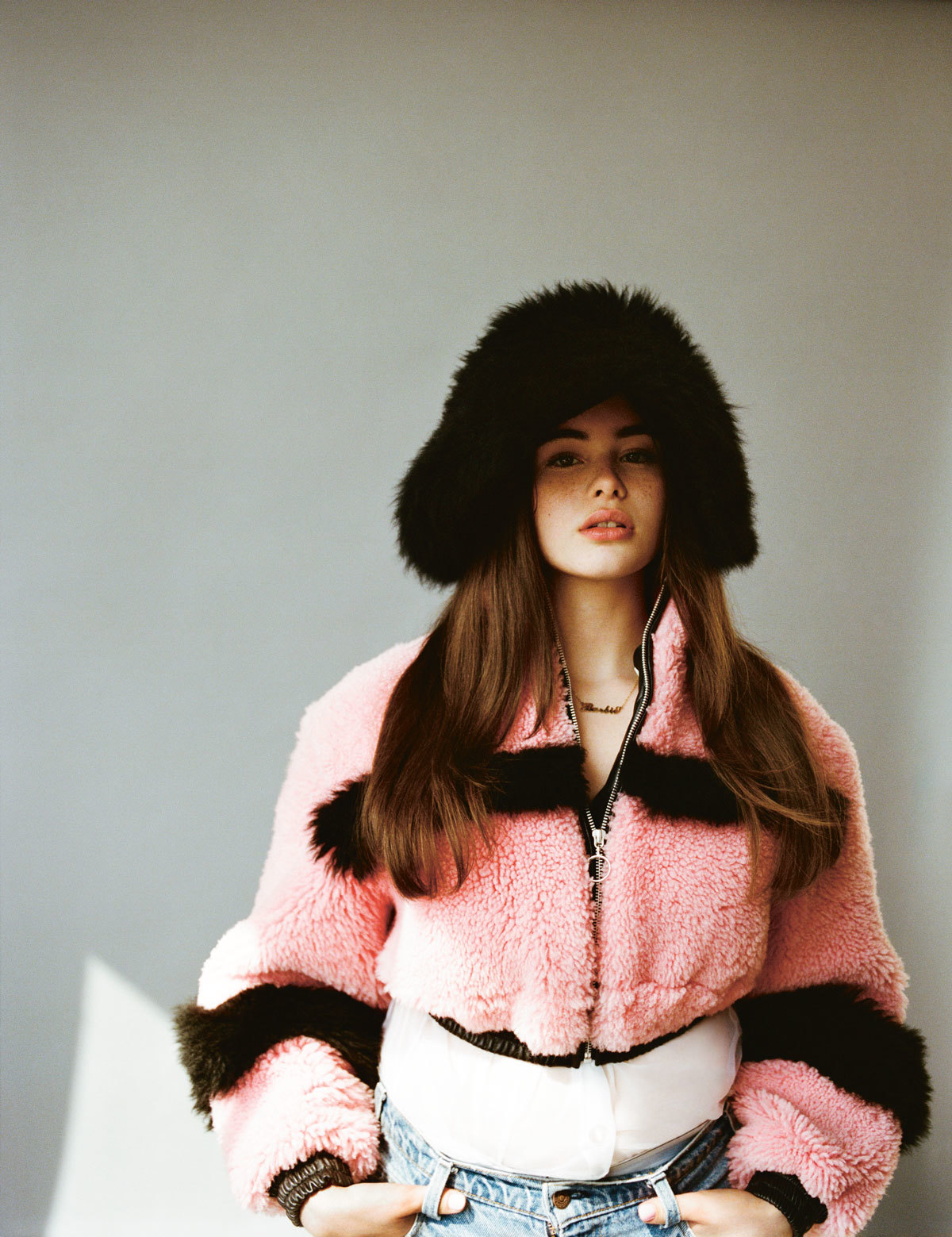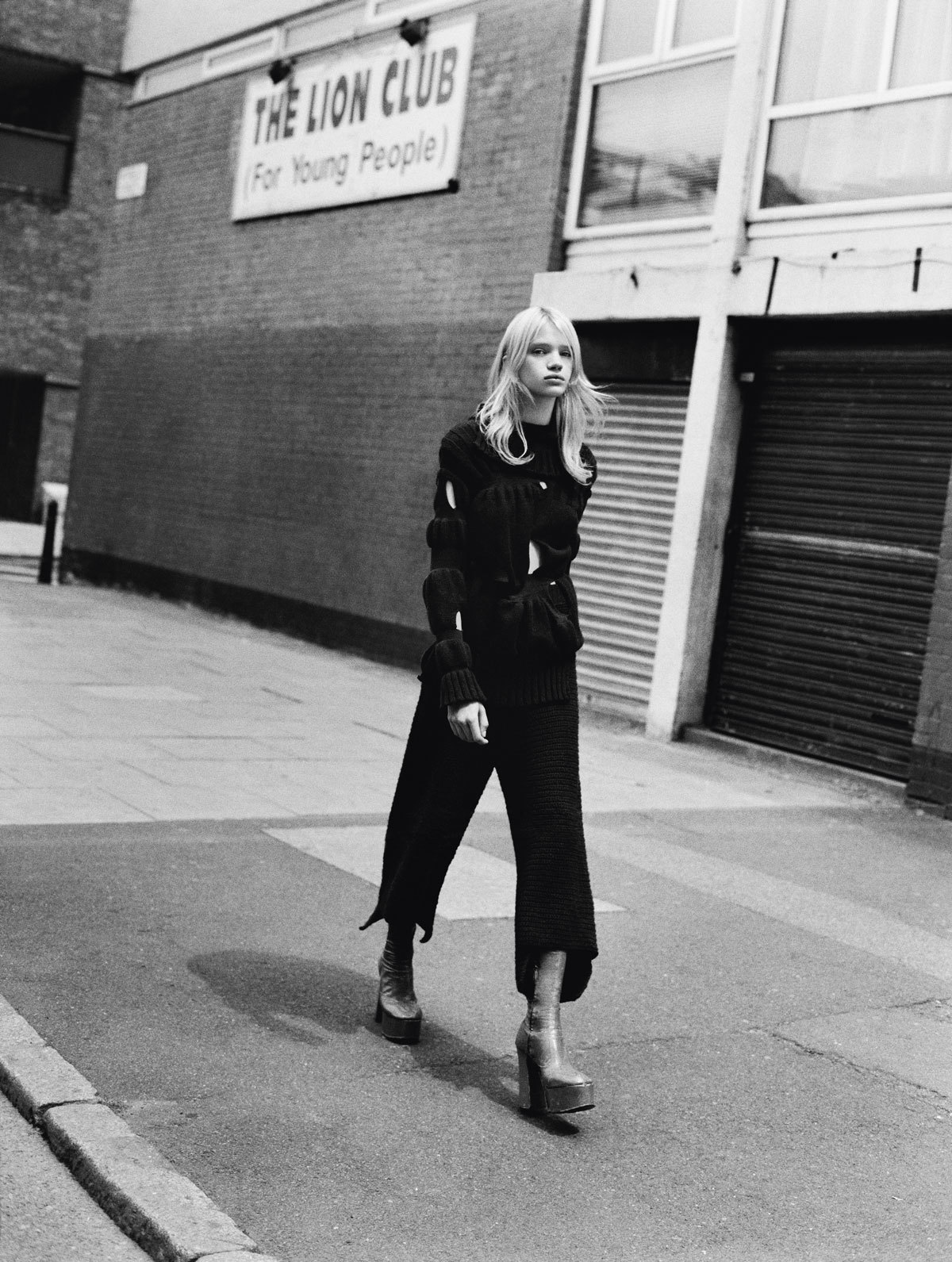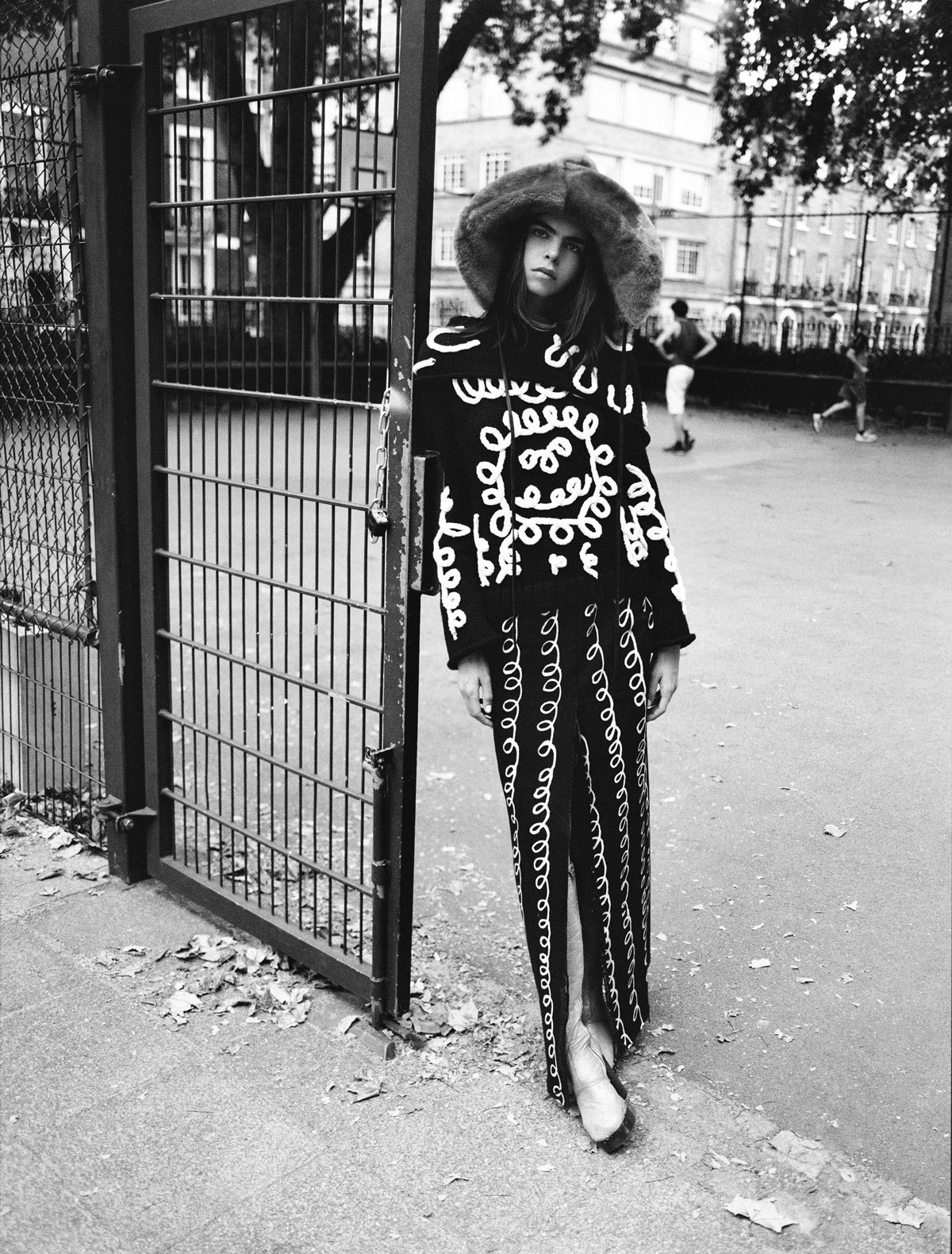When I come to introduce myself to someone, I always find it quite difficult to explain what I do. Now I’m meeting you, on this page, I suppose the quickest way to put it is that I am a talent-spotter. If you have something burningly original to say in fashion, I want to know about you. If you can convince me you’re promising, I’ll try to help you. And if I can’t, I’ll probably know someone who can. The whole point of this piece is to show that everybody has to start somewhere. Everybody is young once, and hasn’t a clue how to navigate into work, or what work really is, and is daunted and panicked about the future. I was. It’s always the worst when you come out of university – though leaving school runs a close second. Here you are, supposed to be an adult, all the daily structure you had around you since the age of five is gone, there are no more exams to pass, and now what? Believe me, as old as you get, you never forget that feeling – or you shouldn’t.
When I was going through that phase, studying English and History of Art at Leeds University and having no idea whatsoever where it would lead, I distracted myself by reading Vogue. Maybe my tutors would have frowned on my waste of study time, but what they didn’t know, and what I didn’t know either, was that studying Vogue was another form of education. One month, I read a page about The Vogue Talent Contest. I went in for it. And here I am. Somehow, I’ve landed up today not just as a Vogue journalist, but as the British Fashion Council’s Ambassador for Emerging Talent, the chair of the NEWGEN Committee, Visiting Professor at Central Saint Martins and Honorary Fellow of the Royal College of Art. My newest title is co-President of the British Fashion Council Education Foundation. We have set it up to raise money and award scholarships, to put in financial support for especially talented students – and help ward some off the damage, which is being wreaked on students’ opportunities by the fees system.
So I’m here to say why it is important that the whole industry keeps encouraging young people. And to point out that there are many more routes, and many more kinds of qualifications and strengths, which can get you into fashion than you might think. Everyone has a different pathway. Some of the old routes have turned into cul-de-sacs, but I see new ones opening up. (In e-commerce; London is a hotspot for it, what with Net-a-Porter, ASOS, Farfetch and the new Style.com opening up here; in fashion as moving image; even in the developing frontier of fashion as exhibition and the production of experiences.) No one hands out maps, because this is a landscape, which is changing.

Some teachers are brilliant and inspired and will set you on the right path for life – or set your mental satnav to find the way when the terrain changes. But others haven’t a clue where the new routes are, or understand what you could be aiming at. And, beware: some new forms of ‘education’ are just set up to take your money. I don’t have to tell you not to throw away your money, or your parents’ money, and end up deeply in debt before you’ve even started. I come from the generation, which was actually paid to go to university. It was normal then. (How blessed we were to grow up in a Britain, which actually believed and trusted in the value of all its young people!) But still, I tremble to think where I’d be if I hadn’t picked up that Vogue, that day, in the Leeds University shop. That was sheer luck, but when my chance came, I was also prepared. Though not, literally, by my degree.
Moral: side-interests, whatever they may be, things you do out of school and go into deeply, might just turn out to be the things which change your life – or, as in my case, become your life. You might even be learning without knowing you’re learning. I’ll never forget sitting in the café at the top of Barneys New York, seeing Christopher Kane give a talk to customers – he was launching his collaboration with J Brand. Someone asked him what he did with his spare time as a kid – probably they were expecting to hear some jock-ish outdoor thing, American-style. “I watched television,” he said. “People always say that’s terrible for children, but it didn’t do me any harm.” Not everyone who watches too much television as a kid turns into a Christopher Kane. But practically all of his collections ever since have had a TV reference sunk into them somewhere. In the 90s, Elsa Klensch’s news and documentary programme about fashion on CNN was his evening school.
As Chief Critic of American Vogue.com, Contributing Editor to American Vogue – and before that, newspapers, American Harpers Bazaar and British Vogue, and a tiny giveaway magazine called Ms London, with a page called Emporium, which was my first real job – I spend a ridiculous number of evenings and weekends writing about fashion, reviewing shows, interviewing designers and then lying awake thinking about why things look as they do, what’s causing it, what’s good about it, what’s getting boring – and what really needs to change. Trying to jigsaw it all together into a picture, which fits into the world is what really interests me – the economy, politics, industry, the feeling of our times. Fashion isn’t separate from any of that, and when it’s at its most brilliant, it is the first place we see really important societal shifts being flashed back at us.

See the whole gender-neutral thing, which has risen up in the past two years? That is massively important, and it’s a truth, which is being said by young people about the way everyone their age just lives and thinks – their non-judgemental, normal, so-whattiness about sexual stereotyping. Who were the first people to stand up and put that out there in a triumphantly visible way? Young fashion designers, of course – yay! Is this the work of disaffected, difficult, lazy people, who don’t care about others and can’t concentrate from one minute to the next? Or is it a warm, collective, moral statement about human nature, which can really help in the world? At times like this, I am proud to be in fashion.
Which is precisely why – though it will never seem like this to you from the outside looking in – fashion always needs young people to keep driving it towards relevance. And I am not just talking about designers, I mean everyone who makes a scene and communicates it, everyone who is good at selling, everyone who would just make a bloody good practical trainee in any number of departments of the business. The longer I am in it, the more I see the patterns emerging, where things are heading, and what we all need to keep functioning as an economy. And the secret no one speaks is that in fashion, older people need to learn from young people. Though often neither side quite realises it.
It’s the fashion these days to put young people down. You officially have shorter attention spans than goldfish (as I was reading the other day). You sit around smoking skunk and taking ‘party drugs’ all day. You never read a book. You never stop taking pictures of yourself. You waste days on computer games. All you care about is Kim Kardashian and Kendall and Caitlyn Jenner. Some of this I do find a little bit provoking myself, as a mother-generation person. I can go off on a parental one with the best of us. Young people are meant to annoy old people. But over and above that, what I always think is this: there are just as many brilliant brains, just as many creative geniuses, just as many kind and selfless and useful people growing up now as there have been in any other generation born to earth.

And just as importantly, whatever privileges some people have, and however obsessed our entire culture is by money, this is also true: talent is not handed out according to class. Talent is not distributed according to who your parents were, given out by nationality, colour or sexuality. Talent comes from everywhere. London is the absolute exemplar of that: a truly tolerant, multicultural city which educates creative people from all over the world, which benefits from being the home of hundreds of designers, many of them not British. This brings me to the complicated question of what talent is, and where to find it, and what, exactly, is needed to support it. I spend my working life as a journalist constantly scanning the horizons for the flickering signs of anything, which looks capable of setting things off in a new direction.
My sense of curiosity cannot bear not to know where the next ideas are coming from, and I realised a long time ago that if I wanted to find them first, it wasn’t going to happen sitting on my backside on a front row. That is when I started to make an effort to go out to visit designers in their studios, to try to understand what makes them tick, and what their problems are. Journalists usually wait for designers to come to them – but that seemed stupidly lazy to me, when there was a whole generation of graduates living and working down the road in Dalston and Hackney. (This is a tip I would throw at anyone who wants to be a good fashion writer – bond with people! Observe! Describe! Relationships count!)
Around that time, I was asked to become a member of the NEWGEN Committee. In 2009, when the British Fashion Council reorganised, I was asked to chair NEWGEN and was given the title of Ambassador for Emerging Talent. (Sounds grand but what it amounts to is introducing people I know to London designers and facilitating connections, which ‘fit’.) What can I say? The roll-call of NEWGEN designers populates London Fashion Week and – even more vitally – they are exporters, often producing their clothes in Britain, who sell all over the world. Christopher Kane, Erdem, Mary Katrantzou, J.W. Anderson, Jonathan Saunders, Peter Pilotto, Roksanda Ilincic, Simone Rocha and Marques’Almeida are amongst them.

The NEWGEN scheme sifts roughly 150 designers per season. The committee is a volunteer, highly committed team of top-level buyers, fashion editors and consultants. We interview a shortlist of people who have been in business long enough to have sold to a couple of stores. What do we look for? First, to be surprised. It’s no good approaching us with anything, which looks a bit like something else. Trust us, we’ve seen it all – and who cares about imitations when you can buy the original? Most of all, lately we really like designers with a signature, who do one thing really, really well: like Molly Goddard and her smocked tulle dresses for tomboys, or Marques’Almeida, who shredded denim for England (or rather Portugal, where they come from), or Faustine Steinmetz, who is doing intense things with weaving and reweaving denim. Start from executing one idea well, and maybe you can build out; make your world.
I’m a realist, though. Situations change. I am very aware that there is very little likelihood that the next generation of graduates, shackled with debt, will want to set up their own businesses straight out of university. The government has killed off that entrepreneurship. So? There are other doors open now. The designers who got out of Central Saint Martins and the Royal College of Art in the ‘golden’ years, who are now significant London fashion employers, are crying out for qualified backup staff – not so much designers, as those who can pattern-cut, sew, take on merchandising, sales and finance roles. We have Burberry in this city – a company, which has a whole photographic and video-producing studio in its basement, and five floors of departments above.
You see, every generation will find its way. If you know the lie of the land, you can be prepared. Right now, if someone came to me and said she wanted a future in fashion, and she showed me something she had sewn with her own hands, I’d say, learn to be a pattern-cutter! Scarcity creates markets. A high-placed LVMH executive, who I sat next to at the British Fashion Awards, told me that their top pattern-cutting expert is chauffeured around their brand headquarters in Paris, because the expert hand of that person will make the difference between an ordinary, failing thing and a beautiful garment which will fit women, flatter them, and win their lifelong loyalty. So, yes, the fact is you wouldn’t even need a degree to get on that path.
As for designers? Well, my hope is that we will be seeding a ‘sleeper’ generation through the British Fashion Council Education Foundation. Talent will out, always. It’s just that the next wave, who need jobs, will go out into the industry, learn from other people, and then – if what they want to say burns enough inside them – these are the ones who will learn, save up, and come back to say what they mean. It’s going to take a bit of time. But I’m patient.
1. Being a bit of an outsider is a good thing.
Fashion needs people, who have a distanced and critical perspective on what goes for ‘normal’. People who don’t think they ‘belong’ see things more sharply (good for writers); people who dress differently shake things up (good for stylists).
2. You have a surname. Use it.
If you introduce yourself to an influential person with your first name only, you might as well not have bothered. Unless you actually believe you are on a memorability on par with Kim, Kanye, Beyoncé, Naomi and Kate?
3. There is strength in numbers.
Everyone wants to know about groups, gangs, tribes, movements, collectives. Get together with friends. Support each other. Stand for something. Be noticed.
4. Can you actually make it?
The biggest delusion is that you can be a designer without knowing how to sew, pattern-cut and invent new techniques. Anyone can print a portfolio out of a computer, but unfortunately this is zero proof of your creativity or skills.
5. You need to be a mind reader.
This is the first qualification for an assistant who will go all the way. Watch your stressed-out boss. Maybe she or he hasn’t got time to tell you what to do. Don’t just sit there – pick up on what they need.
6. Fashion is not a job, it’s a life.If you think it will be nine to five, with free weekends, you’re applying to the wrong place.
Fashion people work like maniacs, often with months of very little sleep, because they love it. So if you don’t love it that much…
7. Collage your career.
It’s a hard fact of life that there are fewer full-time jobs these days. On the other hand, you can make your way with freelance assisting and short-term contracts, mixed up with doing other kinds of work.
8. This is personal.
It is very surprising how small the fashion world actually is. To make a good impression, adopt a blanket policy of friendliness to all. Fashion has a reputation for bitchiness but being a nice person gets you further.
9. Unpaid graduate ‘internships’ are illegal.
By law, only a student can count as an ‘intern’ if this work experience is formally incorporated for a fixed period as part of their course. Once you have graduated, employers must treat you as a paid employee.
10. Time is on your side.
If you want to be a designer, don’t think you need to spring straight out of college onto the catwalk. Go and work for someone, learn from them, then decide if you’re still driven to go it alone. It’s not a race.
Credits
Text Sarah Mower
Photography Matteo Montanari
Styling Victoria Young
Hair Luke Hersheson at Art & Commerce
Make-up Hiromi Ueda at Julian Watson Agency using Chanel Le Lift and Le Volume Ultra-Noir
Nail technician Sophy Robson at Streeters
Photography assistance Niccola De Cecchi
Digital Operator Nick R Bentham
Styling assistance Fan Hong, Gabrielle Lawrence, Fainche Burke
Hair assistance Mitra Mirlashari
Make-up assistace Nobuko Maekawa
Production Mathilde Carlotti at Rosco Productions
Production assistance Michael Esty
Casting Shelley Durkan
Models Bee Beardswoth at Tess Management. Frances Coombe at The Hives. Stella Lucia at Viva London. Poppy Okotcha at Select. Barbie Ferreira at Wilhelmina.
